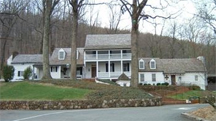What is a colonial ordinary ? (a) a daily meal, consumed before dinner, (b) a second-rate menu item, © a tavern providing a meal at a set price. If you guessed “c” treat yourself to an extra dessert at your favorite modern-day inn. In the 18th Century, an Ordinary was an establishment that served meals and, sometimes, provided shelter. Ordinaries, later called taverns or inns, were spaced at regular intervals across the county so that travellers could rest and feed themselves and their horses. Historic Charlottesville had dozens of ordinaries. Alas, from all accounts they were nothing like today’s idyllic bed & breakfasts. Instead, the beds were often infested with bugs and vermin.

And Moore (Albemarle, 1976: 39) reports that a typical meal consisted of eggs, bacon, hoecake, and local moonshine, either peach brandy or whiskey.

One famous local tavern was the Michie Tavern. Transcribed from the 1745 County Court Order Book, Mary Rawlings (194, MACH 5: 9) reported that the rates at Albemarle ordinaries included “good Virginia cyder by the quart” for 7 pence half penny; “a servant’s diet” for six pence; “peach brandy by the gallon” for 18 pence; and “Indian corn by the gall” for 4 pence (note to tourists: 12 pence=1 shilling; 20 shillings = 1 British pound) in today’s currency the “Virginia cyder” would cost about $7.60). If numismatics is your thing, I recommend the Measuring Worth site for all of your Colonial currency conversion needs.
